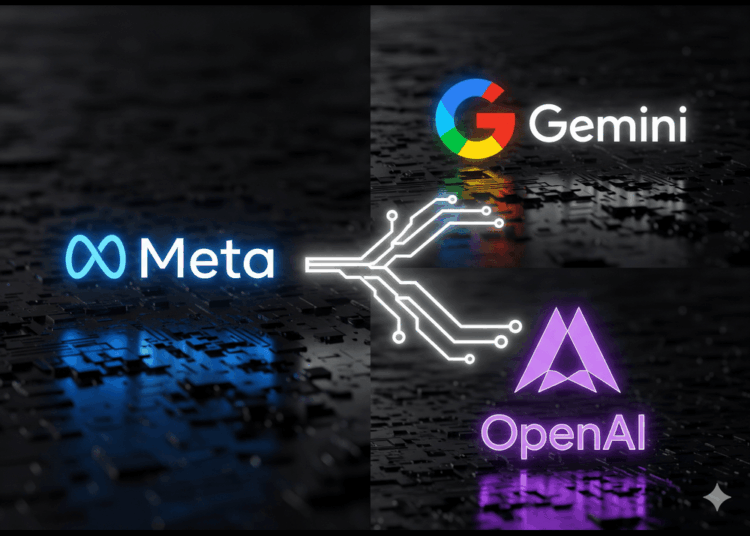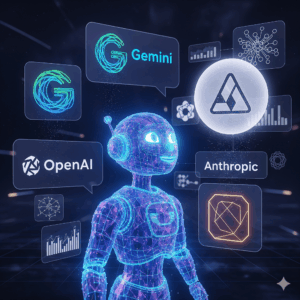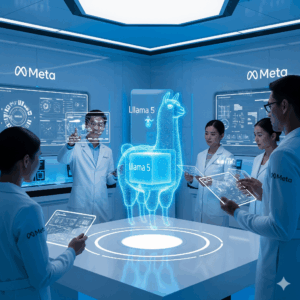Meta’s AI Strategy at a Crossroads
Meta Platforms (NASDAQ: META) is taking bold steps to strengthen its artificial intelligence offerings by exploring potential collaborations with rivals Google and OpenAI. According to a recent report from The Information, leaders at Meta Superintelligence Labs—the company’s newly formed AI research unit—are considering integrating external AI models into Meta’s applications.
The discussions reportedly include Google’s Gemini model and OpenAI’s advanced systems to enhance Meta AI, the company’s flagship chatbot. This marks a strategic shift as Meta balances between building its proprietary AI technology and leveraging external partnerships to maintain competitiveness in the fast-moving generative AI market.
Temporary Alliances for AI Growth
Insiders suggest that any collaboration with Google or OpenAI will likely be temporary. Meta’s long-term goal is to ensure its upcoming large language model, Llama 5, can compete head-to-head with rivals. Still, tapping into established AI models could give Meta a short-term boost, helping it enhance conversational capabilities and deliver richer user experiences across its suite of social media platforms.
A company spokesperson underscored this flexible approach:
“We are taking an all-of-the-above approach to building the best AI products; and that includes building world-leading models ourselves, partnering with companies, as well as open sourcing technology.”
Meta’s Use of External Models Already Underway
While these potential deals remain in exploratory stages, Meta has already begun using external AI models internally. Employees currently use Anthropic’s models to power the company’s internal coding assistant, providing developers with faster and more efficient support. This demonstrates Meta’s pragmatic stance: when progress demands outside expertise, collaboration is not off the table.
Meta Superintelligence Labs: Building the Future of AI
Earlier this year, Meta made headlines by committing billions of dollars to its AI push. The company hired high-profile leaders such as Alexandr Wang, former CEO of Scale AI, and Nat Friedman, former CEO of GitHub, to co-lead Meta Superintelligence Labs. Along with offering lucrative compensation packages, Meta has aggressively recruited dozens of leading AI researchers to build its next generation of large language models.
The ultimate priority for the lab is to ensure that Llama 5 can rival or surpass competitors like OpenAI’s GPT series and Google’s Gemini. With the generative AI race accelerating, Meta is positioning itself as not just a social media giant but a formidable player in the global AI landscape.
The Bigger Picture: Competitive Pressure in AI
The AI space has become one of the most competitive arenas in technology. OpenAI, backed by Microsoft, continues to dominate with its ChatGPT and enterprise AI integrations. Google’s Gemini is advancing rapidly, while Anthropic and other startups are carving out niches in ethical and safety-driven AI.
For Meta, the challenge lies in bridging the gap. By experimenting with external integrations, the company can offer immediate improvements to its platforms—like Facebook, Instagram, and WhatsApp—while giving its research teams time to fine-tune Llama 5.
Looking Ahead: Meta’s Balancing Act
The coming months will be crucial for Meta’s AI roadmap. If collaborations with Google or OpenAI materialize, they could significantly enhance the Meta AI chatbot’s performance in the near term. However, Meta’s long-term success will ultimately depend on whether its in-house efforts can deliver competitive, scalable, and innovative models.
For now, Meta is hedging its bets—building internally, partnering externally, and continuing its commitment to open-source contributions. This “all-of-the-above” strategy signals Meta’s determination to remain at the forefront of the AI revolution.
Discover more insights on the AI race in IMPAAKT, the top business magazine for future-ready leaders.














